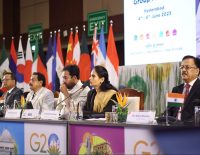AIIMS leads the change in celiac disease management

The 1st Asian Pacific Celiac Disease Symposium (APCDS 2024), focusing on the critical aspects of management, diagnosis, and treatment of Celiac Disease, recently concluded in New Delhi. The sessions held underscored the importance of timely diagnosis and innovation in the management of this condition.
The symposium was organized by AIIMS in collaboration with Asia Pacific Association of Gastroenterology (APAGE) and International Society for the Study of Celiac Disease (ISSCD). APCDS 2024 brings together leading experts, healthcare professionals, and stakeholders to discuss the growing prevalence of celiac disease in the Asia-Pacific region. It aims to address the emerging challenges and opportunities in epidemiology, diagnosis, criteria, and management. With a surge in cases in Asian countries like India post-prominence in Europe and America, the symposium will be a crucial platform for in-depth discussions, bringing the condition to the forefront and the need for timely diagnosis and management.
Speaking about this, Dr Govind Makharia, Professor, Dept of Gastroenterology and Human Nutrition, AIIMS, said, “The 1st Asian Pacific Celiac Disease Symposium has provided a crucial platform to discuss the emerging challenges of celiac disease in our region. There is a need for efforts to increase awareness and enhance diagnostic and treatment capabilities. Celiac disease knows no borders, and the symposium has emphasized the need for a united front in addressing this global health issue. Our collaboration is vital to foster research, improve diagnostics, and ensure better outcomes for affected individuals.”
Dr Choon Jin Ooi, the President of Asian Pacific Association of Gastroenterology (APAGE) louded the efforts of Dr Makharia in increasing awareness of celiac disease in Asian countries. He further stated that the APAGE has created a Working Group on Celiac Disease in Asia under chairmanship of Dr Makharia to foster collaboration and increase awareness about celiac disease in Asia.
Adding further, Dr Robert Paul Anderson- President, International Society for the Study of Celiac Disease (ISCCD), said, “As we explore alternative treatments and drugs for celiac disease, events like the Asian Pacific Celiac Disease Symposium play a pivotal role in shaping the future of research and development. With the rising awareness of the disease, there is a potential for a significant surge in the number of individuals diagnosed with the condition, leading to an increased demand for a Gluten-Free Diet (GFD). There is thus an urgent need to explore alternative or adjunct therapies for individuals with celiac disease, and the insights gained in the conference will help in this regard.”








Comments